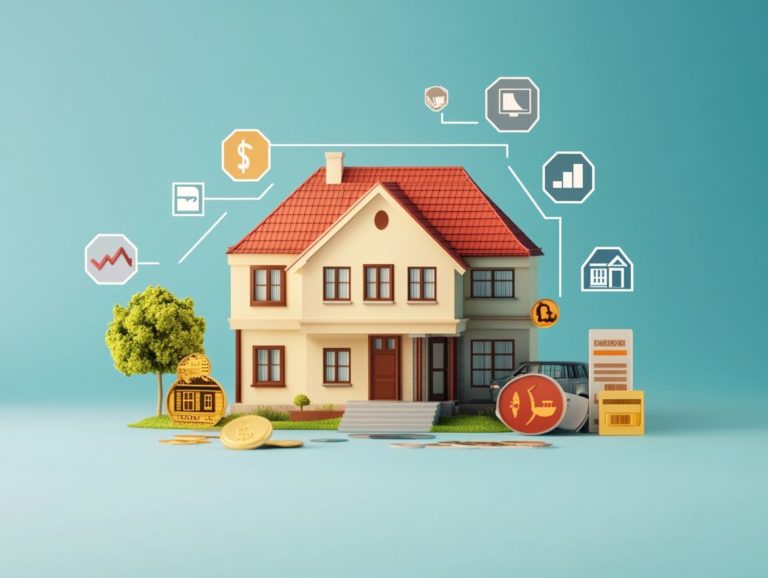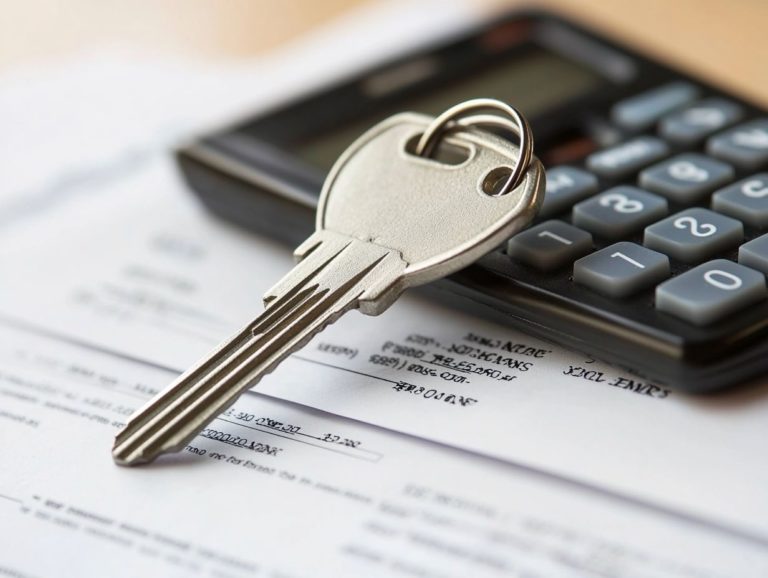Understanding Fixed vs. Adjustable Rate Mortgages
Buying a home is thrilling! It s one of the most significant financial decisions you’ll face, so it s crucial to understand the types of mortgages available.
This guide will explore two main mortgage options: fixed-rate and adjustable-rate mortgages. You ll learn their definitions, key features, and the pros and cons of each.
We will also discuss important factors to consider when picking between these options. This guidance will help you make a decision that aligns with your financial goals.
Contents
- Key Takeaways:
- Fixed Rate Mortgages
- Adjustable Rate Mortgages
- Factors to Consider
- Making the Decision
- Frequently Asked Questions
- What is the difference between a fixed-rate and an adjustable-rate mortgage?
- How does the interest rate on a fixed-rate mortgage compare to an adjustable-rate mortgage?
- What is the advantage of choosing a fixed-rate mortgage?
- What is the advantage of choosing an adjustable-rate mortgage?
- What factors should I consider when deciding between a fixed-rate and an adjustable-rate mortgage?
- Can I switch from a fixed-rate mortgage to an adjustable-rate mortgage (or vice versa) in the future?
Key Takeaways:
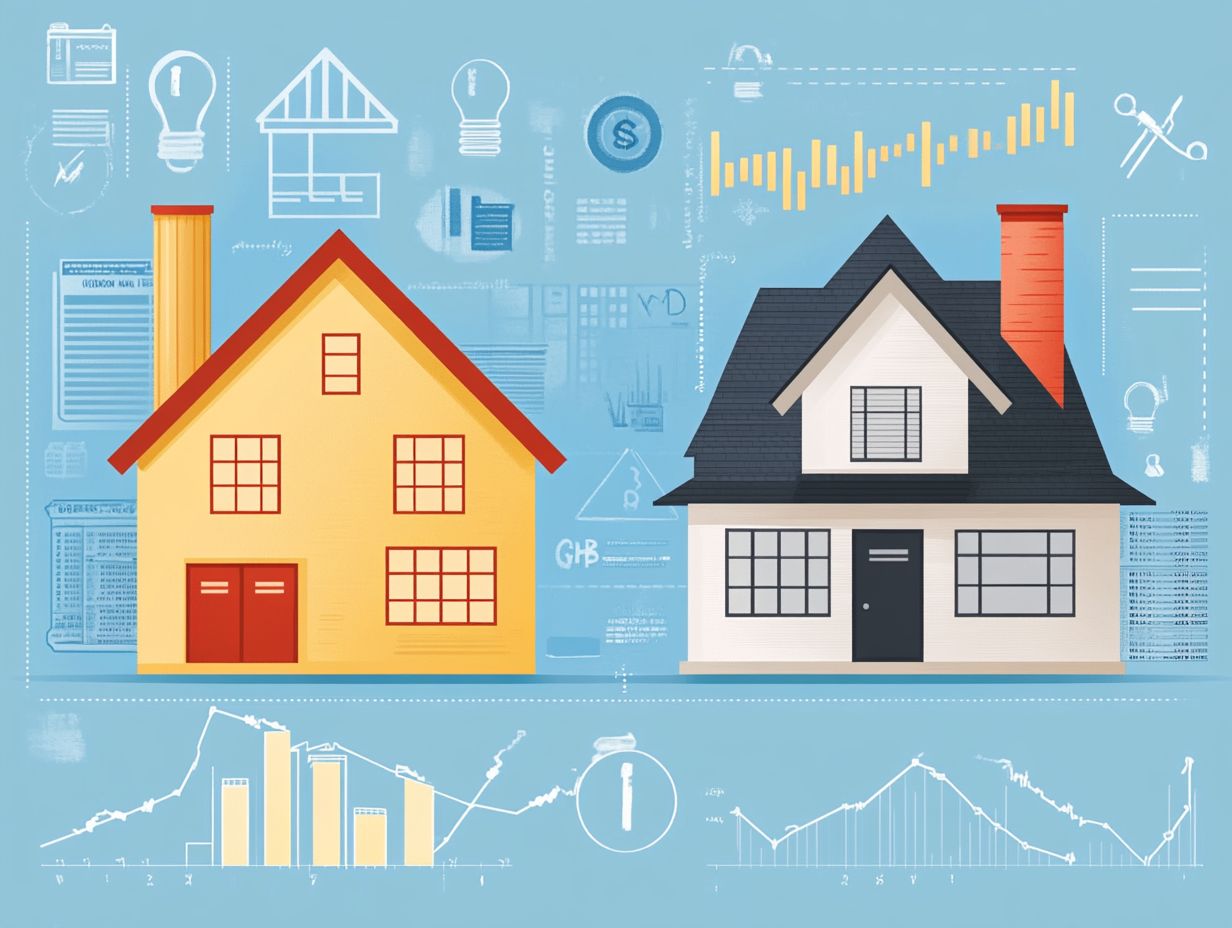
Fixed-rate mortgages have a consistent interest rate throughout the loan term, offering stability for budgeting. Adjustable-rate mortgages may start with lower rates but can change over time, making budgeting trickier. Consider your financial stability and future plans when choosing between the two options.
What is a Mortgage?
A mortgage is a loan you take to buy your home. In return, the lender keeps a lien on your property until you repay the loan, which includes principal and interest payments.
There are various types of mortgages, such as fixed-rate and adjustable-rate, each with unique features.
With a fixed-rate mortgage, you enjoy steady monthly payments, making budgeting easier. In contrast, an adjustable-rate mortgage might start with lower rates, but those rates can fluctuate based on market conditions, introducing some risk.
Before taking on a mortgage, evaluate your financial situation. Think about the loan amount, the monthly payments you can handle, and the overall costs of homeownership.
Fixed Rate Mortgages
Fixed-rate mortgages are a popular choice for homebuyers due to their stability and predictability.
With a steady interest rate lasting 15 to 30 years, budgeting becomes straightforward.
This stability helps with long-term financial planning, making it a safer choice than other mortgage types.
Definition and Characteristics
A fixed-rate mortgage has an unchanging interest rate and equal monthly payments throughout the loan’s life. This clarity helps you understand your financial obligations confidently.
Fixed payments allow for effective budgeting without the unpredictability of variable-rate loans. Loan amounts can vary widely, catering to your needs and qualifications. The initial interest rate affects your total mortgage cost over time.
Since your payments stay constant, you can easily include them in your financial plan. Locking in these terms protects you from future rate increases, fostering stability throughout your mortgage.
Pros and Cons
Fixed-rate mortgages offer predictable payments and possible tax benefits from interest deductions. However, they might come with higher initial interest rates compared to adjustable-rate mortgages, making careful decision-making essential.
Understanding these factors is vital as you navigate home financing. The predictability of fixed payments simplifies budgeting and brings peace of mind, especially during economic uncertainty. Balance this with initial costs and any penalties for early repayment.
With these insights, you can make informed decisions, ensuring that the stability of fixed rates aligns with your long-term goals and personal circumstances.
Adjustable Rate Mortgages
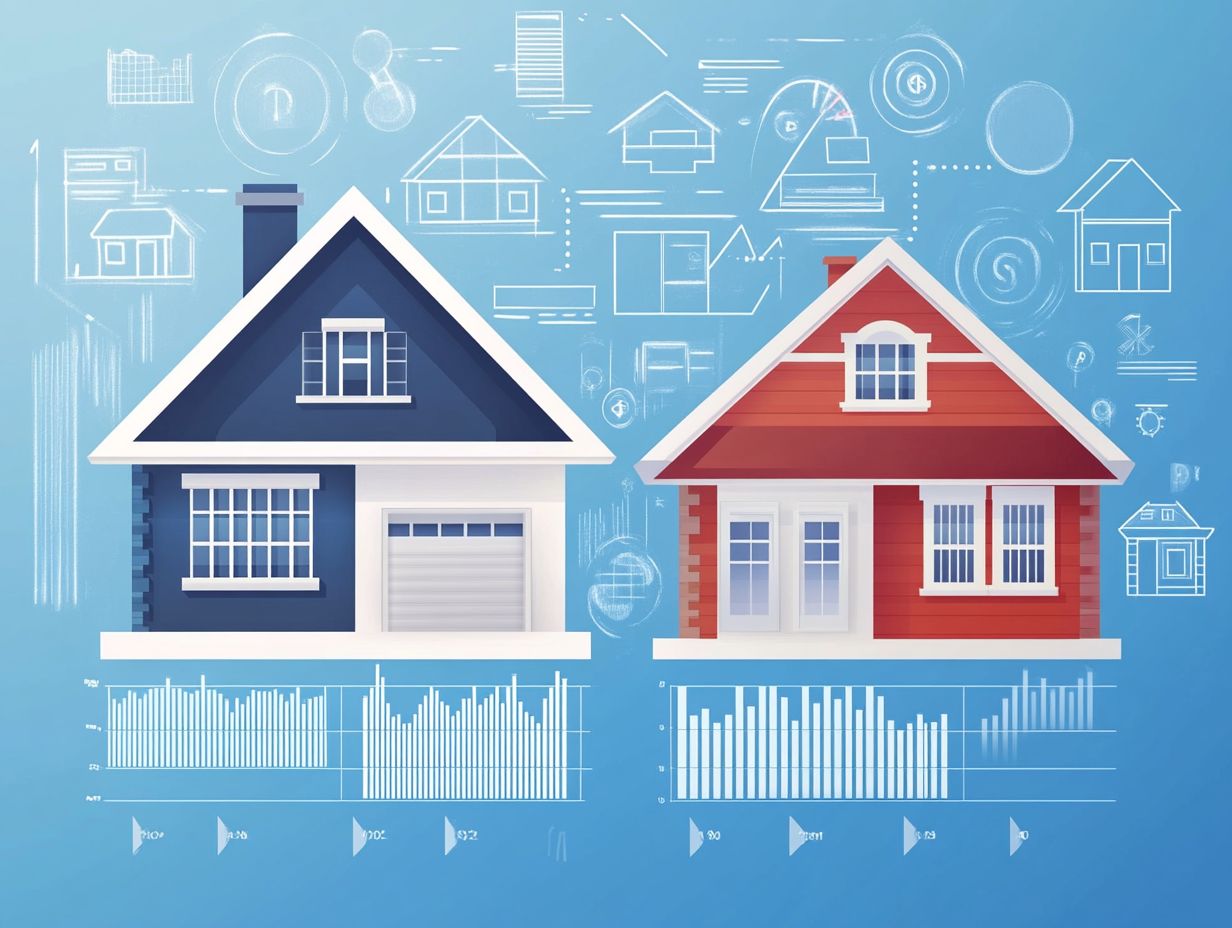
Adjustable-rate mortgages (ARMs) present a compelling opportunity for you to benefit from lower initial interest rates during an introductory period. This feature makes them particularly appealing if you’re looking to lessen your initial mortgage payments.
Be mindful of the possible risks; as rates adjust, your future monthly payments could rise significantly, potentially impacting your budget.
Definition and Characteristics
An adjustable-rate mortgage (ARM) offers an appealing initial lower interest rate, but those rates adjust periodically based on market conditions. This means your monthly payments can fluctuate, influencing your long-term financial decisions in unexpected ways.
Typically, these changing rates are tied to a benchmark interest rate like LIBOR (London Interbank Offered Rate) or the U.S. Treasury yield, along with a margin that your lender sets. As economic indicators evolve, you may encounter increased payments when rates rise, potentially straining your budget or prompting you to explore refinancing options.
This variability is a critical factor to consider as you plan your finances. It can impact not only your monthly cash flow but also your overall financial stability. Therefore, grasping the intricacies of an ARM is essential for making well-informed choices about homeownership.
Pros and Cons
- Lower initial payments
- Potential for reduced overall interest costs
- Risks from possible rate increases
- Need for refinancing
These loans can be particularly appealing for first-time homebuyers or those working within a tighter budget. The initial lower payments can make the dream of homeownership much more attainable. However, as interest rates fluctuate, you might encounter unexpected payment increases, which could lead to financial strain.
Consider refinancing to secure more stable terms before your rates adjust significantly. By weighing the advantages of short-term affordability against the long-term risks of variable payments, you can make informed decisions that align with your goals.
Factors to Consider
When considering options between a fixed-rate mortgage and an adjustable-rate mortgage, several critical factors demand your attention.
Evaluate your personal financial situation, including your credit score and the size of your down payment. Evaluate your risk tolerance, as these elements can profoundly impact your financial choices in the long run.
When to Choose a Fixed Rate Mortgage
If you seek stability, a fixed-rate mortgage may be your best option! It provides precise budgeting and predictable monthly payments throughout the life of the loan.
This financial product is particularly appealing if you’re a first-time homebuyer or part of a family planning for significant expenses like education or retirement. Locking in an interest rate protects you from future market fluctuations.
Fixed-rate mortgages enable you to craft comprehensive financial plans, minimizing uncertainty in your monthly expenses. Picture managing various commitments, from daily living costs to saving for your child’s college education; the consistent payment structure of this mortgage type enhances your peace of mind.
For those meticulously planning their financial future, this option emerges as a sound and strategic choice.
Don’t miss out on the chance to save money with a lower initial rate!
Ready to explore your mortgage options? Contact a mortgage advisor today to find the best fit for your financial future!
When to Choose an Adjustable Rate Mortgage
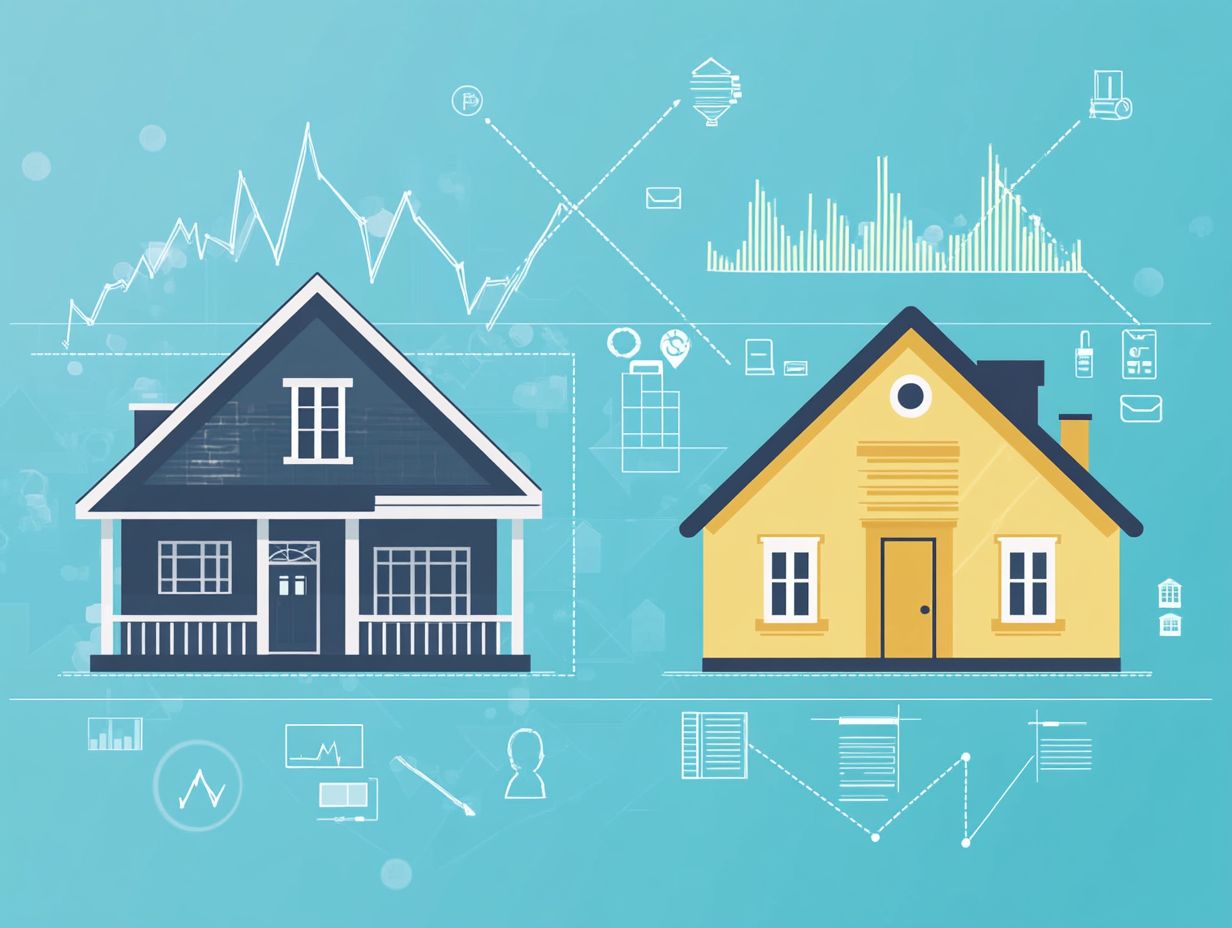
An adjustable-rate mortgage could be the perfect fit for you if you’re navigating short-term financial needs. You might appreciate the advantage of lower initial payments, particularly in a stable market where interest rates are expected to hold steady.
Many find this financing appealing, especially those who foresee moving or refinancing within a few years. You can take full advantage of the lower starting rates that are usually on the table. This approach can significantly enhance your cash flow, making it easier to funnel funds into other pressing financial goals, whether that s saving for a home renovation or building a robust emergency fund.
If fixed-rate options feel overly burdensome due to higher upfront costs, an adjustable-rate mortgage offers the flexibility you need. This can be especially beneficial for first-time homebuyers or those with variable income patterns. It allows you to optimize your financial strategy with confidence.
Making the Decision
Making an informed decision about your mortgage options requires careful consideration of several financial factors. Conduct thorough risk assessments and consult with a financial advisor.
Such guidance helps you grasp the nuances of loan principal, which is the amount you borrow, and payment structures, ensuring you understand the long-term implications of your choices.
Assessing Your Financial Situation
First, assess your financial situation before selecting a mortgage. Factors like your credit score, down payment capabilities, and overall budgeting will define your borrowing options and significantly influence your mortgage terms.
Understanding your credit score is vital. It shapes the interest rates lenders may extend and determines your eligibility for various loan types. A strong score reflects responsible financial behavior, paving the way for more favorable mortgage conditions.
Calculating your potential down payment is equally important. A larger down payment often translates to lower monthly payments and reduced interest over time.
Budget for all associated costs to ensure that your monthly mortgage fits seamlessly within your financial plans. This fosters long-term stability and peace of mind.
Consulting with a Financial Advisor
Consulting with a financial advisor can provide invaluable insights as you navigate the many mortgage options. This partnership aligns your financial planning with your long-term goals while effectively assessing the risks involved.
An experienced advisor guides you through the many mortgage options available. They take the time to analyze your unique financial situation, considering crucial factors such as your credit score, income stability, and future expenses.
With this comprehensive understanding, they can recommend the mortgage types that suit you best whether it s a fixed-rate or adjustable mortgage tailored to your individual circumstances.
Their expertise in risk assessment helps identify potential pitfalls associated with debt early on, enabling you to make informed decisions that support your financial well-being. This strategic collaboration equips you to approach such significant commitments with confidence, ensuring that your chosen mortgage aligns seamlessly with your broader financial strategies.
Frequently Asked Questions
What is the difference between a fixed-rate and an adjustable-rate mortgage?
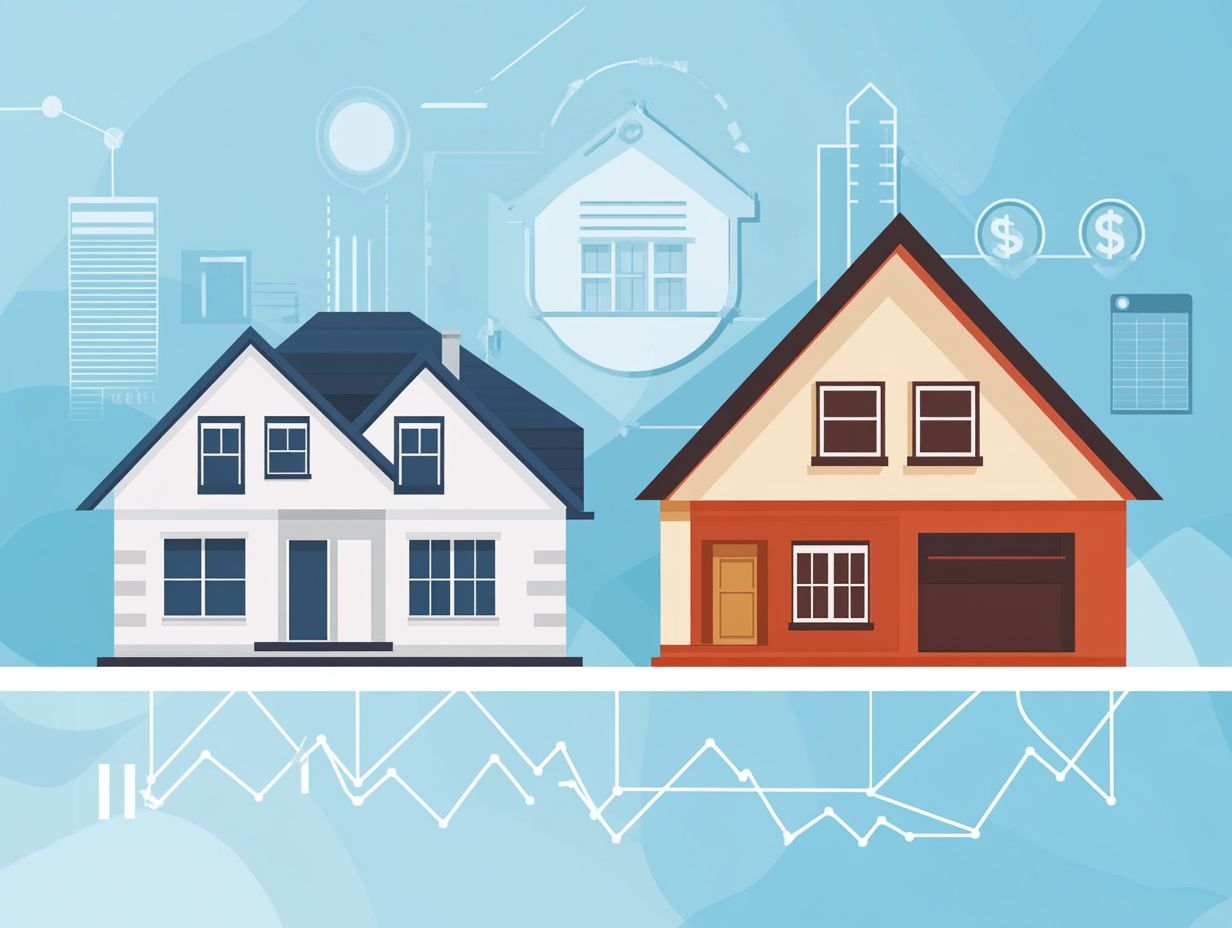
A fixed-rate mortgage has an interest rate that stays the same for the entire term of the loan, while an adjustable-rate mortgage has an interest rate that can change periodically. To learn more about the differences, check out what’s the difference between fixed and variable mortgages?
How does the interest rate on a fixed-rate mortgage compare to an adjustable-rate mortgage?
The interest rate on a fixed-rate mortgage is typically higher than that of an adjustable-rate mortgage, since it offers more stability and certainty for the borrower.
What is the advantage of choosing a fixed-rate mortgage?
A fixed-rate mortgage offers the advantage of a consistent monthly payment amount, making it easier to budget and plan for the future.
What is the advantage of choosing an adjustable-rate mortgage?
An adjustable-rate mortgage can start with a lower interest rate. This means you may enjoy lower initial monthly payments.
What factors should I consider when deciding between a fixed-rate and an adjustable-rate mortgage?
Think about your current finances and your future goals. Also, consider the current housing market.
Can I switch from a fixed-rate mortgage to an adjustable-rate mortgage (or vice versa) in the future?
Yes, you can refinance your mortgage to switch between fixed-rate and adjustable-rate mortgages. The option will depend on your situation and current interest rates.


